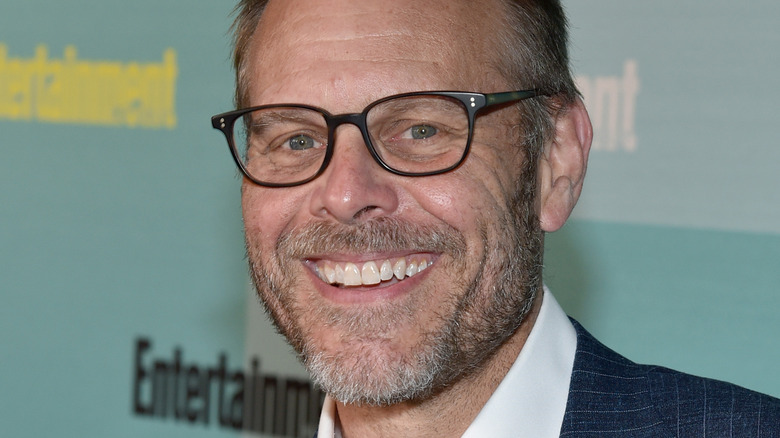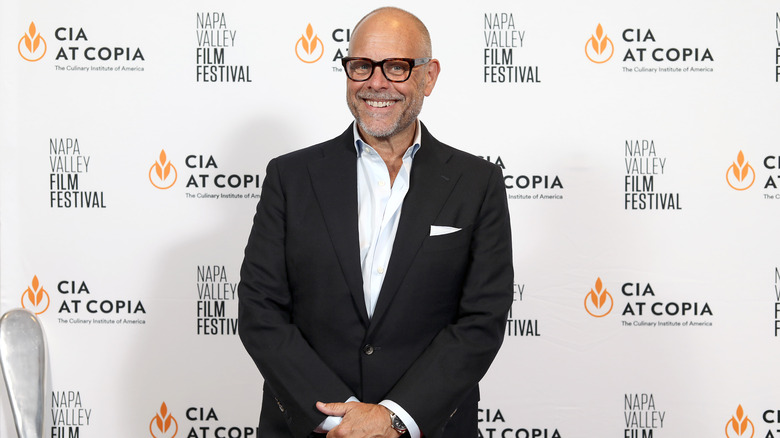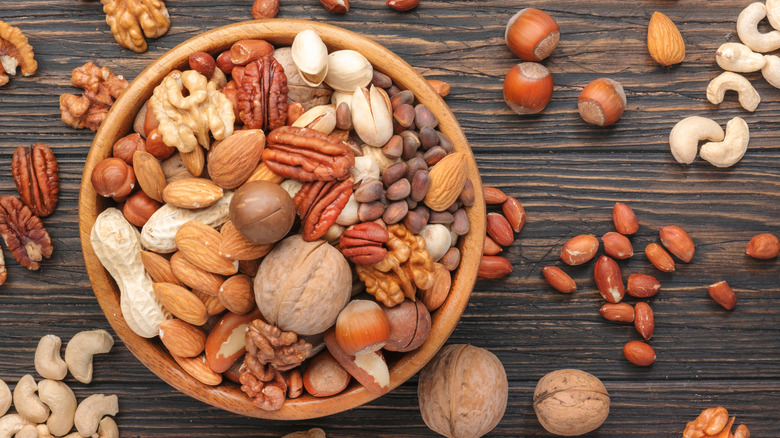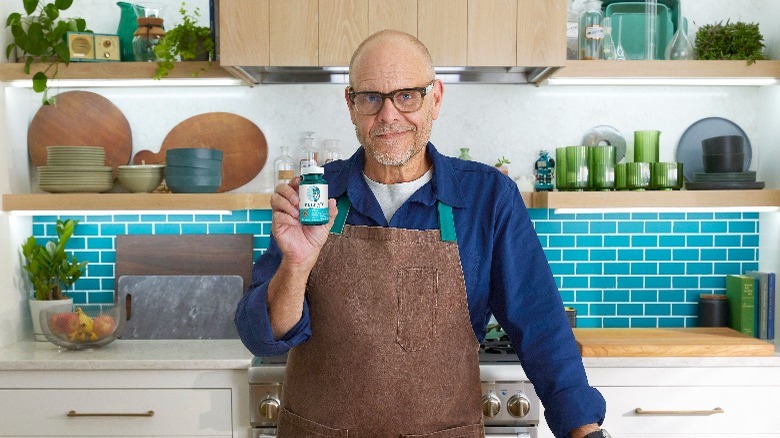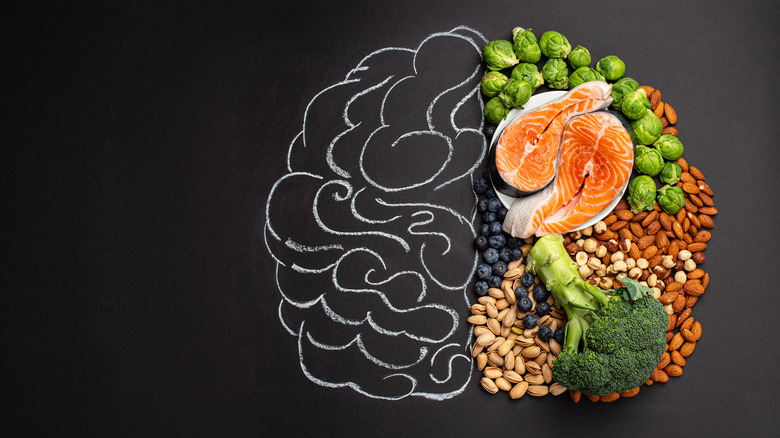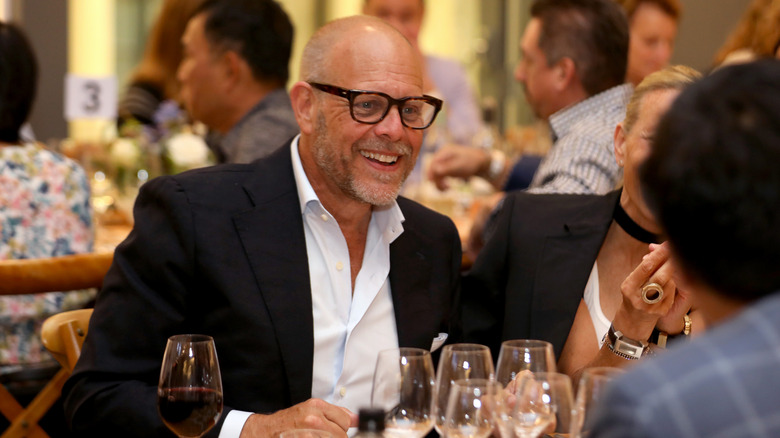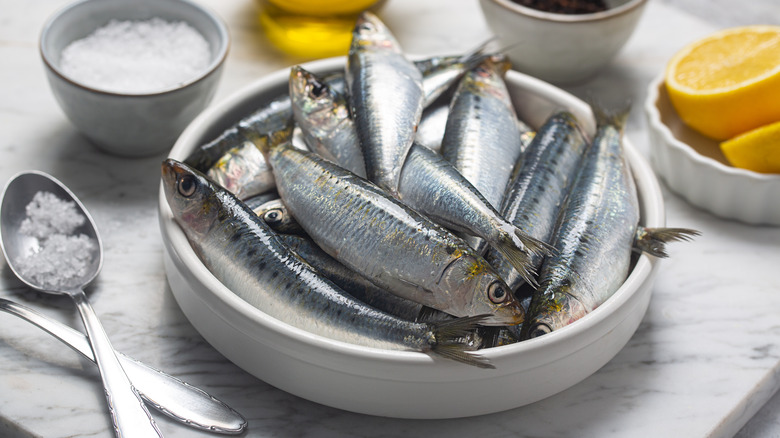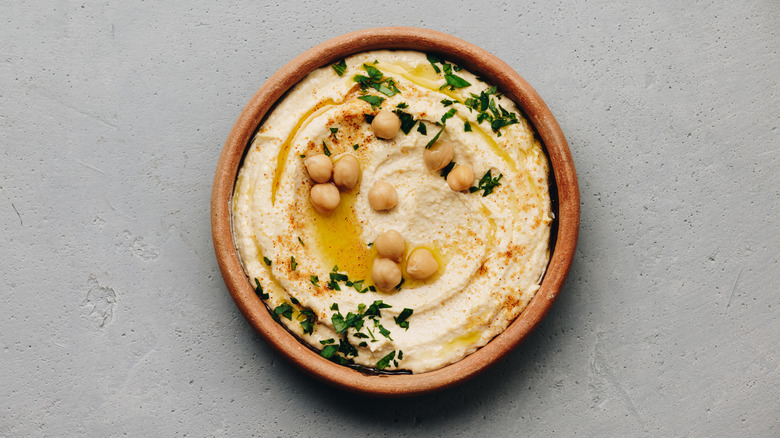Alton Brown Opens Up About Making Lifestyle Choices For Brain Health - Exclusive Interview
Alton Brown is no stranger to the food industry. You may know him from the iconic "Iron Chef America" or popular "Good Eats" cooking shows. Although Brown left Food Network this year, you can find him on Netflix's 2022 summer hit "Iron Chef: Quest for an Iron Legend." The television personality is known as a food scientist with his ability to educate fans on the science behind cooking. Now, Brown is digging even deeper into the science field as he partners up with health supplement brand Neuriva.
In an exclusive interview with Health Digest, Brown detailed how his outlook on life was altered after hitting 60. The celebrity chef explained that there are many ways to support your brain, including exercise, sleep, nutrition, and supplementation. While Brown went into depth on how he is working on his brain health, he also revealed his struggle with food throughout the years. The food mogul named his current go-to meals as well as a brain-boosting recipe that is sure to keep your mind sharp.
How reaching 60 has changed Brown's perception of health
You turned 60 in July. Has crossing this milestone shifted the way that you think about your overall health and wellness?
Hugely. It's not because I feel different. I'm very fortunate in that I basically still feel like I'm 19, not that I really remember 19. But when it happened, I was like, "Wow, 60. It's like 50 didn't ... Bump in the road." 60, people start sending you magazines with large print.
I did a checkup. I made a point to have a big physical and all this stuff. The one thing that I hadn't paid a whole lot of attention to was what was up here [points to head], other than I cut all my hair off. But I started thinking a lot about my brain. I had taken a lot out of it over the years and was like, "Well, I'm going to keep working. Maybe I should take care of that a little more."
I started doing a lot of research, reading a lot of papers, learning a lot about, "What are brains actually made of? What do they need? What are all those cells doing up there? Is there anything I can do? Can I do something for you? What can I do for you?" I got a lot of answers. I had to look up a lot of words that I didn't know, but I learned that there is a way to support your brain. There are a lot of different ways to support your brain. I ended up with four divisions — not in any particular order.
One, it turns out your brain likes physical exercise a great deal. Physical exercise is good for your body, but it is pivotal for the brain. Number two — sleep. I have been terrible about this. I always thought, "Sleep — I'll do that when I'm dead." Your brain actually does require that time. It makes memories then. It does a lot of its more serious thinking during that time.
The other one is what we will call diet, although I believe diet is a way of life, so all of this fits under that. Let's call it nutrition. Let's call it food-based. Nutrition is understanding. When I've dieted in the past, I've tried to always have the mindset of "I'm going to concentrate on what I need, not what I can't have." It's not going to be like, "You can't have a bowl of Captain Crunch cereal." It's, "You need some oily fish." I created a new list based on what I was learning about foods that I knew my brain needed.
Brown on his exercise habits and how foods help your brain
Alton Brown (continued): Oddly enough, they also turn out to be things that our bodies need anyway, dark leafy greens, oily fish, nuts, fruits, although there's been some interesting writing lately about some things in hard cheeses — happy about that — is good for our brains.
Then the fourth division for me is supplementation. I was already a believer in supplements because my doctor is a believer in supplements. I tend to run low on B vitamins, which are utterly crucial for brain function, so he had put me on B vitamins. When I started learning about what was in Neuriva, I got pretty excited because Neuriva Plus has the B6, the B12, and the folate that I certainly was looking forward to, but also the whole coffee cherry extracts.
I've been reading a lot about the phytochemicals in coffee berries — not the seeds, the berries. That is a huge amount of what makes up Neuriva, so I'm pretty excited about that. [It also has] another thing I can't get in my diet very easily, which is phosphatidylserine, which comes from soybeans. That is something that is necessary for our neurons and our nervous system to properly maintain its cell membranes. Flexibility, plasticity — there's a lot going on in here and we can do things for it. We can support it. That's what I'm trying to do now, because I'd like to get another 20 years out of that thing.
Wow. You broke that down perfectly. That makes a lot of sense.
I've been thinking about it. Those are the four big things.
Is there anything specific, this year or otherwise, that you incorporated into your daily routine to maintain your mental health?
Yes. I am exercising more, but I refuse to do exercise that I don't want to do. I will not get on an exercise bike. However, my wife taught me how to paddle board, so we do a huge amount of paddle boarding, swimming, biking, things that are actually fun. I used to think of that as stolen time — "I ought to be working." But now I think of it as, "I can't work well if I don't do this."
[It's] the same with sleep. I've got a rule now about staying away from electronic screens for at least an hour before I go to bed, and I've set myself bedtime, like a kid. I have a bedtime because I need to try to get myself to at least seven hours sleep a night. I'm not there yet — too many years waking up and working in the middle of the night. I'm trying to eat brain-supportive foods at least three to four times a week, including my bowl recipe, which, by the way, is freaking delicious.
Why Brown partnered with Neuriva and changed his sleep routine
I'm excited to try it — I think they're sending it over.
It's really good. Even people that don't like kale tend to this one. I am taking my Neuriva, and I'm not changing much else. A healthy life, a diet, has to have a fair amount of joy in it, and you got to be able to cut yourself some slack.
Our modern life is not incredibly brain-friendly in a lot of ways. Our lives lead us down some funny roads. I'm not going to sit around and do brain games because they make me feel stupid, so I'm reading books more, I'm getting more sleep, I'm properly supplementing, and I'm paying a lot more attention to what my brain needs from a food standpoint. Those are pretty major changes, at least for me.
Absolutely. I've noticed a huge difference in my sleep when I put down my phone an hour before.
It is amazing, the benefits of turning everything off for a while. My wife's done a lot of reading about the way the optic nerve gets charged and the way that certain centers of our brain get irritated, literally irritated, by a freaking glowing little thing that we're all looking at all the time. Stopping that and reading a book or talking to each other ends up being a much better way to go to sleep.
What inspired you to partner up with a brand like Neuriva?
I'll be really honest — science. I like science. I'm one of the people that actually read their entire white paper and then cross-referenced it to all of the papers that they quoted. I like the science. It comes down to — Neuriva Plus, which is the thing I take every day — we know about or a huge amount has been written about B vitamins, which a lot of us don't get enough of.
I became interested in phosphatidylserine, which is incredibly important for healthy nerve membranes. They used to get that from bovine brains. They don't anymore; we get it from soybeans. That's not something that I could figure out how to quantify in my diet. It's like, "How much edamame do I need to eat to get that?" I don't know, so I need a supplement.
The biggest thing is that all the science that I have read involves Neurofactor or the whole coffee cherry extract. It's amazing to me. When you look at the phytochemicals — I want to say there's over 20 in there — how we are just starting to understand what that can do for our nervous systems in our brains is pretty incredible. I've been a coffee fan for a long time, but that's the bean. That's where the caffeine is.
[I'm] reading those things. When I pick up this bottle and I'm like, "This, this, this, this," well, I've read about those things, and I can't get enough of that any other way, so this has become a pretty important part of my regimen because of the science. I'm focused on prioritizing my brain health, and I believe in the science behind Neuriva. It fits perfectly into my holistic health regimen, which includes exercising, eating a balanced diet, and getting a good night's sleep.
Brown unveils his brain-booster recipe
You mentioned that you created a brain-booster recipe. You said it included kale, and did you say salmon? What other kinds of food does it include?
I hope that you'll get the recipe. They'll send it to you. Quinoa, which I'm a huge fan of, is the grain that holds things together. There's a lot of parsley. There is a lot of kale. Walnuts are there, and a lot has been written about walnuts in brain support. There is some hard feta cheese there — because cheese — and there's dried fruit. You can have it straight up like that, and we often do. My wife and I eat that without anything.
If you take the time to pan sauté a piece of salmon to put on there — I break up the salmon and cut up the salmon skin and mix into the bowl — you could almost live off of it. I can't say for sure it's the healthiest recipe that I've ever written, but I feel pretty confident in saying it's one of them. It's got a lot of flavor, a lot of textures. It hits all of my taste and flavor goals for myself.
Brown opens up about his relationship with food
You've been a food personality for 20-plus years. How has that affected your relationship with food and healthy eating?
Man, I've been a pretty serious food abuser most of my life. I wasn't the guy who was trying to figure out how to feed my body or my brain. I was the guy that was trying to figure out how to get that ninth cheese in the macaroni and cheese. I admit, I was all about sensation and all about conjuring pleasure. What I've done, at least in the last few years ... I will not call myself a health cook. You will not be seeing a healthy eating book from me, because people recoil from that kind of thing. But I am responsible in some part for how long I remain on the planet.
A lot of that is about what I put in this hole [points to mouth]. I'm trying to take a lot more responsibility and adventure into how much flavor enjoyment I can get out of the things that I know that I should be putting in there. What's great about that is if I concentrate on that most of the time, then the rest of the time I can do something different, like have a martini or something that I can't exactly justify from a healthy ... It's all about this word "balance," and it actually is about balance. I also believe that it goes wider — who you eat with is just as important as what you eat.
I try not to ever eat alone. I used to, and I don't now. I'm not saying that I don't sneak out at night and have a little ice cream when Elizabeth is asleep, but I find my wife and I have a great relationship greatly because of eating together, taking our meals together, sitting, talking with each other. It slows down how you eat. She'll get this, I'll get that, we share. People need to slow down. Cook for yourself; cook for your loved ones as an expression of love.
Eat together. It is so important. People ask me today, "What's the most important tool in the kitchen?" I say, "Number one is your brain. Number two is the kitchen table where you sit down and break bread with people." I know that sounds ... hokey, but I know a lot of people who are still living great lives in their 80s and older who do that and make time for that.
What Brown really eats in a day
Speaking of your wellness routine, what do you typically eat in a day? What does a day look like for you, food-wise?
Depends on where I am. If we're home in Atlanta, it's one thing. We're in our little apartment in New York right now, so it's another thing, because we've got spots all over town that we want to hit where people make food that I can't begin to ... By and large, our diet is highly grain-based and fish-based.
We eat almost no beef anymore — very rarely, and it's a treat when we do. We concentrate on eating a lot of small shilling fish that grow to maturity very quickly and are sustainable. I've been cooking this morning. I made a peanut rice dish and opened up a tin of smoked mackerel and threw some of the mackerel on the rice. Elizabeth's eating it right now.
We have a ... We call it the fish bank. We have a shelf of canned fish, which turns out is something that my wife and I both love. Find what you love that's good for you and eat as much of it as you can. I will eat all the tinned fish in the world.
What kind of fish do you typically eat? What's your favorite to grab?
Massive amounts of sardines. Smoked sardines. Marinated sardines. Canned mackerel. We eat a huge amount of squid, because I'm pretty sure they would eat us all if they could. They're aliens.
When it comes time for a beverage, we drink a lot of red wine because there's a lot that's been written about that. We use a great deal of olive oil over other fats in the kitchen — I'm not saying we rule out butter, but I don't reach for it all the time. We tend to reach for oils. My wife, who is very much a — well, she's not a vegetarian, but she loves dark greens — so we will probably never run out of kale. We just don't.
Brown reveals his favorite dinner recipe and snacks
Would you say a go-to dinner recipe would be some fish, kale, red wine, and that's what you normally like to do?
There would usually be a grain there too. I cook a lot of different grains, from farro to buckwheat to cracked wheat for tabbouleh. We eat, also, a fair amount of beans. We eat a lot of hummus. We probably make hummus three times a week, and we'll make it out of different things. We don't always make it out of chickpeas. I make it out of lima beans.
We like spreads — we're dippers. In fact, dinner for us looks more like hors d'oeuvres than at any other house. We pick and we tend to sometimes stand around the counter and eat and talk. There's a lot of spreads, a lot of dips, usually bean-based dips. Half my weight is probably hummus, now that I think about it.
That's not a bad snack to love.
It's so versatile, and you can throw any herb in there. My wife's big thing is pesto. She can make pesto out of gravel. Pesto can be stuffed in a fish [and] can be spread on a chicken. Those are things — find those basics that you know are good for you, that you know contain good whole foods, and try to make that the center of your culinary existence.
Absolutely. You can get creative with it, too.
Very much so. These are very versatile ingredients.
Brown gives eating travel tips and details on his upcoming tour
You have a culinary variety show coming up in November. That's very exciting. What are you most excited about?
It's our third that we've done. We're going out with what we call the holiday variant. The best part of it [is] being in a room with a bunch of people again. It's so wonderful after having a couple of years of being locked up. It's really nice to see people and to hear laughter. That's a serious medicine for me. Of course, if they don't laugh, that's not good ... Definitely read the room.
It can be hard to keep up healthy habits when you're traveling, especially on your tour that's coming up. What strategies will you be utilizing during your tour to keep it up?
You make it easy to not fail. We live on a bus — there are three buses on our tour for the crew. What Elizabeth and I do is we have a grocery list, a list of stuff that we know will keep us fed and healthy that'll keep us from going too far off the rails, that we always have in the refrigerator on the bus. We always make sure we are loaded to succeed with the understanding that we're still going to fail 20% of the time.
I have a French fry problem. I'm not going to lie. I would eat all the French fries — all of them. There would be none left on planet Earth by the time I was done. I'm going to get to have fries twice a week. I'm going to let myself have that. I'm not going to fight that. But the rest of the time, I'm going to make sure that I've got stuff to reach for that at least my body and my brain won't reject. When things get rough, having decent supplements, I'm a believer in, and being able to know that you're guaranteeing your brain certain things is always good.
Learn more about Neuriva's brain health supplements on their website. Head to Alton Brown's website to keep up with his latest projects.
This interview was edited for clarity.

